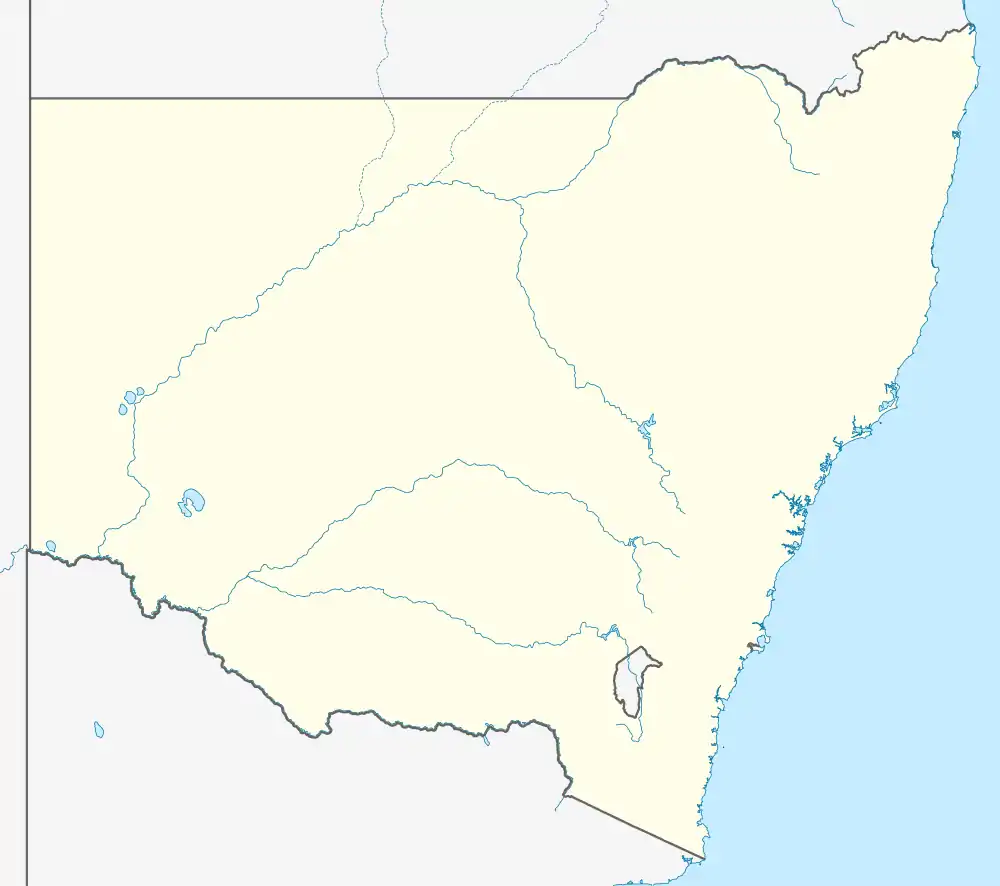Monga, New South Wales
Monga is a locality in the Queanbeyan-Palerang Region, Southern Tablelands, New South Wales, Australia.[2][3] It lies on the Kings Highway at the top of the Clyde Mountain, about 110 km east of Canberra and 22 km southeast of Braidwood. A large part of the locality forms part of the Monga National Park. At the 2016 census, it had a population of 14.[1]
| Monga New South Wales | |||||||||||||||
|---|---|---|---|---|---|---|---|---|---|---|---|---|---|---|---|
 Monga National Park | |||||||||||||||
 Monga Location in New South Wales | |||||||||||||||
| Coordinates | 35°34′57″S 149°55′02″E | ||||||||||||||
| Population | 14 (2016 census)[1] | ||||||||||||||
| Postcode(s) | 2622 | ||||||||||||||
| Location | |||||||||||||||
| LGA(s) | Queanbeyan-Palerang Regional Council | ||||||||||||||
| Region | Southern Tablelands | ||||||||||||||
| County | St Vincent | ||||||||||||||
| Parish | Monga | ||||||||||||||
| State electorate(s) | Monaro | ||||||||||||||
| Federal Division(s) | Eden-Monaro | ||||||||||||||
| |||||||||||||||
Monga lies near the watershed of the Shoalhaven and Clyde River catchments; the Mongarlow River flows to the Shoalhaven and the Buckenbowra River—flowing to the Clyde—has its source within the locality.
The area, now known as Monga, lies on the traditional lands of the Walbanga people.[4] An early bridle track to the Buckenbowra Valley, known, as the Corn Trail by early settlers, was originally a Walbanga footpath.
There was once a small village of the same name, which lay near the right bank of the Mongalowe River, on the Clyde Road near the junction with the road from Reidsdale and Major's Creek [5] (the modern day River Forest Road). The road to Major's Creek is still called Monga Lane.[6] It was the location of a tollbar on the Clyde Road—from 1860 to 1865[7]—and a village site was officially reserved there in 1881.[8][5]
The first sawmill was established in 1880 and was powered by large waterwheel, using water from the river. It operated until 1914.[9][10]
By the mid 20th-century, Monga was a timber village, with a large sawmill nearby.[11][12] The village had 18 houses in 1948—more were being built to house timber industry employees—and a 'bachelors' quarters' housing 12 single men.[13] A new village hall was built in 1954.[14] Monga had a provisional school from 1947 to 1955 and a public school from 1955 to 1971.[15][16]
The sawmill closed in 1966, when the supply of high quality timber was depleted.[17][18] The operator, Monga Sawmill Pty Limited, was wound up in the same year.[19] However, it was reopened by new owners and worked until at least 1975.[20][21] Without employment and a school, the village faded away and there is little sign of it now.
Nearby Mongarlowe, which in the 19th century was a much bigger settlement, was called Monga until 1891.[22]
References
- Australian Bureau of Statistics (27 June 2017). "Monga". 2016 Census QuickStats. Retrieved 14 March 2018.

- "Monga". Geographical Names Register (GNR) of NSW. Geographical Names Board of New South Wales. Retrieved 26 January 2021.

- "Monga". OpenStreetMap. Retrieved 26 January 2021.
- "Tindale Tribes - Walbanga". archives.samuseum.sa.gov.au. Retrieved 24 January 2021.
- "Parish of Monga, County of St. Vincent [cartographic material]". Trove. Retrieved 8 January 2021.
- "Monga Ln". Google Maps. Retrieved 15 January 2021.
- "PROCLAMATION". New South Wales Government Gazette (Sydney, NSW : 1832 - 1900). 8 December 1865. p. 2759. Retrieved 8 January 2021.
- "SITE FOR THE VILLAGE AT MONGA". New South Wales Government Gazette (Sydney, NSW : 1832 - 1900). 25 April 1881. p. 2349. Retrieved 8 January 2021.
- "History lingers beside a busy highway". Canberra Times (ACT : 1926 - 1995). 7 February 1970. p. 11. Retrieved 16 January 2021.
- "OBITUARY". Braidwood Dispatch and Mining Journal (NSW : 1888 - 1954). 29 August 1941. p. 2. Retrieved 16 January 2021.
- "HERE AND THERE". Braidwood Review and District Advocate (NSW : 1915 - 1954). 30 November 1954. p. 2. Retrieved 8 January 2021.
- "Official Opening of Monga Sawmill". Braidwood Dispatch and Mining Journal (NSW : 1888 - 1954). 22 October 1948. p. 1. Retrieved 15 January 2021.
- "MONGA GROWS, TOWNSHIP SPRINGS UP IN THE FOREST". Braidwood Review and District Advocate (NSW : 1915 - 1954). 8 June 1948. p. 3. Retrieved 16 January 2021.
- "MONGA'S NEW HALL". Braidwood Dispatch and Mining Journal (NSW : 1888 - 1954). 12 November 1954. p. 1. Retrieved 16 January 2021.
- "Monga school (2) in the School history database search". New South Wales Department of Education. Retrieved 14 March 2018.
- "Glossary of school types". education.nsw.gov.au. 3 December 2019. Retrieved 16 January 2021.
- "DISTRICT NEWS Sawmill closure followed by protests". Canberra Times (ACT : 1926 - 1995). 13 July 1966. p. 23. Retrieved 15 January 2021.
- "DISTRICT NEWS Efforts to keep sawmill open fail". Canberra Times (ACT : 1926 - 1995). 18 August 1966. p. 25. Retrieved 15 January 2021.
- "MONGA SAWMILL PTY LIMITED (RECEIVER AND MANAGER APPOINTED).—Notice is hereby given that a meeting". Government Gazette of the State of New South Wales (Sydney, NSW : 1901 - 2001). 19 August 1966. p. 3470. Retrieved 15 January 2021.
- "Re-equipped mill nears century". Canberra Times (ACT : 1926 - 1995). 4 March 1970. p. 32. Retrieved 16 January 2021.
- "COMPANY NEWS Timber group sold". Canberra Times (ACT : 1926 - 1995). 10 October 1975. p. 12. Retrieved 16 January 2021.
- Information sign at Mongarlowe